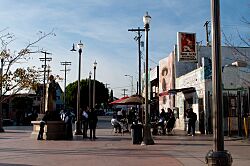Lucha Reyes (Mexican singer) facts for kids
Quick facts for kids
Lucha Reyes
|
|
|---|---|
| Born |
María de la Luz Flores Aceves
23 May 1906 Jalisco, Mexico
|
| Died | 25 June 1944 (aged 38) Mexico City, Mexico
|
| Other names | "Ranch Queen", "La Reina de la Canción Ranchera", Elvira Luz Reyes, |
| Occupation | Singer, actress |
| Years active | 1920–1944 |
| Musical career | |
| Genres | Ranchera, Mariachi, Mexicana, Regional Mexican music, Pop. |
| Instruments | Vocals |
| Labels | RCA Víctor Mexicana |
María de Luz Flores Aceves (born May 23, 1906 – died June 25, 1944) was a famous Mexican singer and actress. She was known by her stage name, Lucha Reyes. Lucha was born in Guadalajara, Jalisco, Mexico. She became very popular in the 1930s and 1940s. People often called her the "Queen of Ranchera music."
Contents
Lucha Reyes' Early Life
Lucha Reyes was the daughter of Miguel Ángel Flores and Victoria Aceves. Her father passed away when she was very young. She later took the last name Reyes from her mother's second husband. He helped raise her until she was a teenager.
Lucha and her family moved to Mexico City. They lived in a simple home there. Because of challenges, she did not finish primary school. Later, she joined the church choir at Iglesia de Carmen. Her singing career began when she was 13 years old. She performed in a tent in Plaza San Sebastián. She shared the stage with comedians like Amelia Wilhelmy.
Lucha Reyes' Career
Lucha Reyes traveled to the United States to study singing. In 1920, she went on a tour across several states. She became a beloved figure among Hispanic communities there. She teamed up with Nancy Torres. Lucha decided to stay in Los Angeles for a while. During this tour, she met a journalist named Gabriel Navarro. They were married soon after. Lucha and Gabriel later separated, and she returned to Mexico in 1924.
Lucha decided to start a solo singing career. She quickly became popular with Mexican radio listeners. She also had a busy schedule performing in theaters. In 1927, she tried to perform in Europe. She joined Juan N. Torreblanca on a tour. The tour was stopped in Berlin for reasons that were not made public. A piano player who traveled with them had to perform at a local bar. This helped Lucha afford a plane ticket back to Mexico.
One good thing from this tour was that Lucha recorded her first music. This was one of the first times Mexican music was introduced to European audiences. At this time, Lucha was not a ranchera singer. She sang as a soprano. Lucha had packed light clothes for her European trip. The cold weather in Europe, compared to Mexico, made her sick. This caused her to lose her voice. Her voice changed after this illness. When she returned to Mexico, she started singing "rancheras." One of her first ranchera songs was "Guadalajara." It became a classic hit.
In 1928, Lucha Reyes officially started her solo career. The next year began her most successful period as an artist. She had many hit songs. These included "La Tequilera" and "¡Ay Jalisco, no te rajes!". Other popular songs were "El corrido de Chihuahua" and "El herradero." She also sang "La Panchita," "Traigo un amor," and "Juan Colorado." In 1930, a businessman named Frank Founce hired her. She performed many concerts at the Million Dollar Theater in Los Angeles.
Lucha Reyes also acted in movies. She had supporting roles in Con los dorados de Villa (1939). She also appeared in El Zorro de Jalisco (1941). Her last movie appearances were musical guest roles. These were in ¡Ay Jalisco... no te rajes! (1941) and Flor silvestre (1943).
Lucha Reyes' Personal Life and Passing
Lucha Reyes was married three times. In 1934, she married her second husband, Félix Martín Cervantes. At the time of her passing, she was married to Antonio Vega Medina, who was a pilot.
Lucha Reyes had a short life, like many famous stars of her time. She passed away on June 25, 1944.
Lucha Reyes' Legacy
Lucha Reyes has a statue in East Los Angeles, California. She visited the city many times during her career. The statue is located in Mariachi Plaza. This area in East Los Angeles is mostly Hispanic.
See also
 In Spanish: Lucha Reyes (cantante mexicana) para niños
In Spanish: Lucha Reyes (cantante mexicana) para niños
 | John T. Biggers |
 | Thomas Blackshear |
 | Mark Bradford |
 | Beverly Buchanan |


